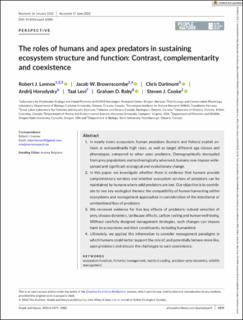The roles of humans and apex predators in sustaining ecosystem structure and function: Contrast, complementarity and coexistence
Lennox, Robert; Brownscombe, Jacob W.; Darimont, Chris; Horodysky, Andrij; Levi, Taal; Raby, Graham D.; Cooke, Steven J.
Peer reviewed, Journal article
Published version

Åpne
Permanent lenke
https://hdl.handle.net/11250/3046104Utgivelsesdato
2022Metadata
Vis full innførselSamlinger
- Publikasjoner fra CRIStin - NINA [2364]
- Scientific publications [1392]
Sammendrag
In nearly every ecosystem, human predators (hunters and fishers) exploit animals at extraordinarily high rates, as well as target different age classes and phenotypes, compared to other apex predators. Demographically decoupled from prey populations and technologically advanced, humans now impose widespread and significant ecological and evolutionary change. In this paper, we investigate whether there is evidence that humans provide complementary services and whether ecosystem services of predators can be maintained by humans where wild predators are lost. Our objective is to contribute to two key ecological themes: the compatibility of human harvesting within ecosystems and management approaches in consideration of the intentional or unintentional loss of predators. We reviewed evidence for five key effects of predators: natural selection of prey, disease dynamics, landscape effects, carbon cycling and human well-being. Without carefully designed management strategies, such changes can impose harm to ecosystems and their constituents, including humankind. Ultimately, we applied this information to consider management paradigms in which humans could better support the role of, and potentially behave more like, apex predators and discuss the challenges to such coexistence.
